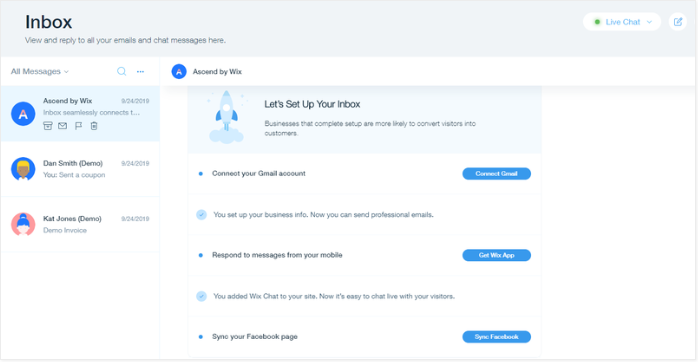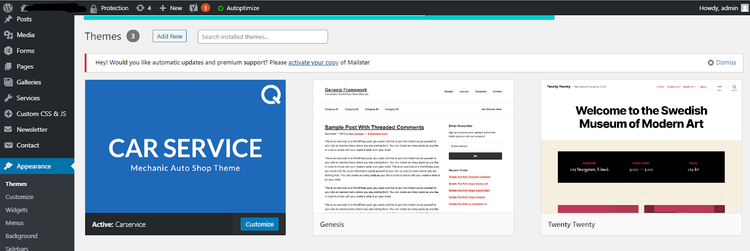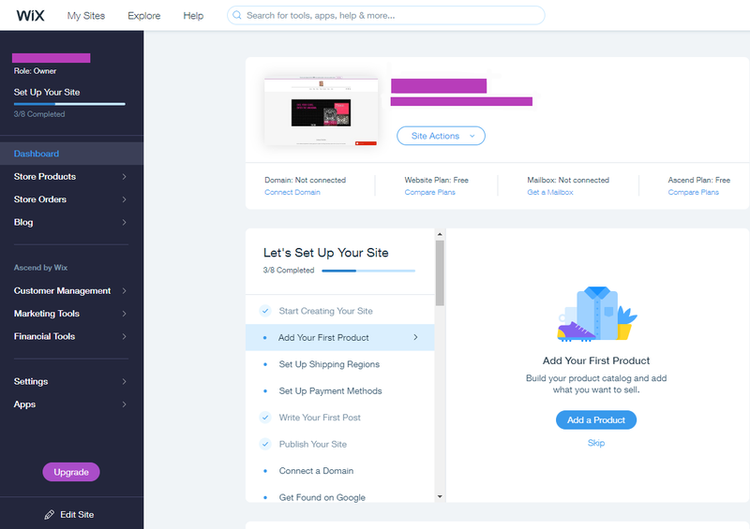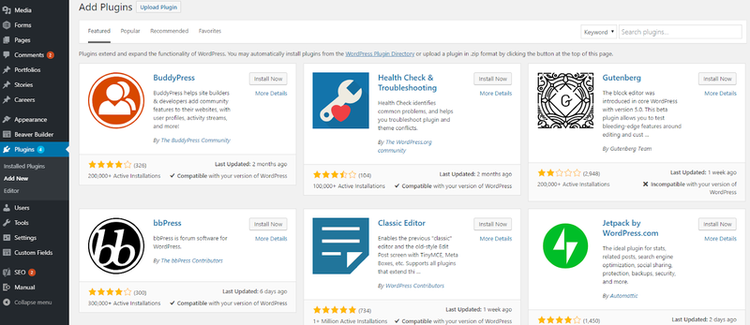Owning and managing a business website doesn't have to cost a fortune. Thanks to the advent of content management systems (CMS), it's easier than ever to build a website from scratch.
But that begets the question: which CMS is best? Venerable WordPress is well known as one of the earliest content management systems. Newer entrant Wix has gained traction in the CMS world, and is now regarded as a top choice.
Let's compare WordPress vs. Wix so you can decide which is the right one for your business needs.
Wix vs. WordPress: An overview
Wix and WordPress are the biggest players in the CMS space today, but they took different paths to prominence. That history is reflected in how each operates as a CMS, and affects the types of businesses each attracts.
Who is Wix for?
The Wix CMS serves over 160 million websites. There's a reason why it's a popular choice. It was built from the ground up for small business sites and designed specifically for those lacking technical acumen.
As a result, Wix functionality is intended for those who don't want to spend a lot of time constructing a site, allowing users to quickly get a website up and running.
Just be mindful that this approach creates limits to its customization capabilities.
So if you're looking for a CMS that does the heavy lifting and you don't have unique needs, Wix is perfect for you.
Who is WordPress for?
WordPress was originally built as a blog creation tool when blogging rose to prominence in the early 2000s. Over time, it evolved into a full CMS solution, and amassed the largest market share among CMS platforms, meaning more websites use WordPress than any other. So if you like a brand with a proven history, few can match WordPress.
Its tenure also gave rise to a large community of software developers and companies that support the platform. This community built thousands of apps and plug-ins designed to adapt and customize your website for virtually any business need.
This makes WordPress perfect for sites that require capabilities beyond the basics.
WordPress may require more time and effort to craft your website than Wix, but it gives you the freedom to design and build your site the way you want.
Wix vs. WordPress: Features
Both Wix and WordPress possess compelling features. Given the different approach each takes to site building, the capabilities can vary quite a bit between the two.
What Wix offers
Because Wix is about getting off the ground quickly, it's thought through all the basic necessities of website functionality.
- User-friendly design: As mentioned in our Wix review, the platform offers a slew of website templates designed to make your site intuitive for visitors. Just pick one, apply some small customizations, such as changing background colors, and you've got a site that looks great and is easy to navigate.
- Security: Wix handles website security. This is important because you don't want your website getting hacked.
- SEO: Search engine optimization (SEO) is all about making changes to your site to improve its chances of showing up prominently in search engine results. Wix SEO provides basic capabilities out of the gate, and enhanced features for an additional cost.
- Mobile support: Consumers are on mobile phones more than desktop computers. So your website has to work on mobile web browsers. Wix has you covered here. All Wix templates are set up to work properly on mobile devices.
- Web hosting: Web hosting is required to make your website visible on the Internet. Wix includes this as a part of its service, although this means you're stuck with Wix.
Beyond the basics, Wix offers some great additional features.
- A marketplace that extends website functionality through the availability of third party software and services.
- E-commerce capabilities enable selling products online, and provide automation of key e-commerce sales tasks such as automatically following up with customers who abandoned products in their digital shopping cart.
- Built-in communication from chat to email options allows you to stay in touch with your customers.
- If you need to manage multiple websites, say for different product lines, you can do that through the platform.
The downside of Wix's model is that, as your business grows and evolves, you have limited options in terms of changes you can implement on your site. For example, once you pick a template, you cannot change it without starting from scratch again.
You'll also have to add the ability to collect website data from the apps marketplace. This data is essential to understanding how to optimize your website for activities like increasing sales, so you'll have to spend time adding it.

Wix allows you to sync emails, set up live chat features, and track conversations. Image source: Author
What WordPress offers
When it comes to features, WordPress is deep to a fault. It has so many choices for customization, including the ability to manage multiple levels of users as detailed in our WordPress review, that it can be overwhelming.
Thanks to its marketplace of over 50,000 templates, plug-ins, and other tools for your website, any features lacking out of the box can be found through its third party community. The challenge is knowing which third party options are high quality and which run the risk of hampering your site.
In terms of basic website functionality, WordPress has you covered.
- Like Wix, it offers templates, called themes, as a starting point to your site design.
- WordPress SEO is incorporated so well into its themes that many choose it for this reason.
- WordPress does a great job as a repository for your website content. All kinds of files, such as images and videos, can be uploaded into the WordPress content library.
- WordPress won't provide web hosting unless you pay for an upgraded plan, but this also gives you the flexibility to seek a web hosting service you prefer outside WordPress if you choose.
In addition, WordPress is an open-source platform, meaning its code is available for anyone to modify. So if you are a programmer or have someone on your team who codes software, WordPress delivers unlimited customization options.

WordPress themes establish a foundation for your website design. Image source: Author
Results
Winner: WordPress
While Wix offers basic features around website building and an apps marketplace, it's not as extensive as WordPress. The expanded capabilities available through the WordPress community is so complete, no other CMS can compete in this arena.
Wix vs. WordPress: Support
Getting help when you need it is a key component of any software purchase. Here's how each platform performs with regards to technical support.
What Wix offers
Wix provides several avenues for support. Online resources include help articles, video tutorials, forums, and a chatbot to assist in building your website. If none of these address the concern, a dedicated support team can step in with email and phone help. The support available through Wix is one of its outstanding features.
What WordPress offers
WordPress provides direct support only if you pay to host your website on WordPress.com. Otherwise, WordPress support is limited to online documentation such as checklists and video tutorials. That said, WordPress' online library of support materials is extensive. It's just up to you to hunt down the help you need.
Moreover, you can pose questions to the WordPress community. There are also options to obtain support from the third party providers of any apps, plug-ins, or other tools you choose to install from the WordPress marketplace.
However, because you're dealing with different companies, even individual software developers, my experience has been that response times vary significantly from hours to weeks.
So although WordPress' free support resources are robust, it can be a challenge to find a solution to your technical concerns. In addition, help for any third party apps you install may be hard to come by.

WordPress support is primarily through its documentation. Image source: Author
Results
Winner: Wix
If you're stuck with an inscrutable technical issue, it's great to have someone who can help. When a company I worked at set up a WordPress site for part of its business, my engineering team had to intervene several times to fix technical hiccups. If you don't have such a team to fall back on, Wix is one platform that has your back.
Wix vs. WordPress: Ease of use
You want to spend time running your business, not figuring out the intricacies of a software platform. So ease of use is a key consideration. Here's how Wix and WordPress stack up.
What Wix offers
Wix is one of the easiest small business site builders to use. Since it was designed for anyone to create a website, regardless of technical skill, ease of use is inherent in every aspect of the platform.
When constructing your site, Wix's templates incorporate features relevant to the industry template. For instance, choose a magazine template and the ability for site visitors to subscribe is built in. Also, Wix's drag-and-drop capabilities let you quickly and easily move elements of a webpage around in an intuitive manner.
If you'd rather Wix handle the work, its Wix ADI tool builds the site for you. Just answer some questions about your website, and Wix does the rest.
Once your site is built, Wix makes creating and managing your site a simple endeavor.
Editing is straightforward with a what-you-see-is-what-you-get (WYSIWYG, pronounced wizzy-wig) paradigm. This means as you make changes, you can see how it will appear online. So you'll know you've got what you want before it's live.
Wix also handles all the technical details of managing a website, such as web hosting and all-important website security.

Wix handholds you through the entire website creation process. Image source: Author
What WordPress offers
WordPress delivers lots of flexibility, but with this flexibility comes complexity. Because of its blogging roots, some functionality feels bolted on instead of the seamless experience on Wix. As a result, it's got a learning curve even though it's a fairly intuitive platform.
For example, WordPress' editing approach involves multiple steps. To review your changes, you must first enter a preview mode. This means you'll have to click back and forth between edit and preview modes to see how your changes are coming together.
WordPress adds extra steps on another category, too: website security. If updates are required, WordPress automatically performs the changes, just as Wix does, but only if they host your site. Otherwise, you're on your own. WordPress informs you of the updates, but you have to perform them yourself.
After that's done, you'll then have to go through your site to make sure the updates didn't break critical website functionality.
These are just a few examples of how the WordPress experience requires additional work.
Results
Winner: Wix
Wix wins in the ease of use category, hands-down. The platform handles all the technical details of running a website so you can focus on its content and look. This also means less time spent on website management and more time on your business.
Wix vs. WordPress: Pricing
Pricing is an important consideration. Both Wix and WordPress offer appealing pricing options.
What Wix offers
When it comes to price, you can't beat free. The basic website builder is offered at no cost, making Wix for blogging, an online portfolio, or other personal website, a perfect choice.
For more features, an upgrade to a premium plan starts at $13/month. Several other plans provide increasingly more functionality, such as e-commerce. So you can choose the right plan for your business needs.
What WordPress offers
Because WordPress is an open-source platform, it's always free to use. To begin accessing support staff, you must hop onto one of WordPress' paid plans, which begin at an affordable $4/month.
Where pricing becomes complicated is when you need to add features through third parties. Since many capabilities come from the WordPress marketplace, the third parties there charge various fees for their plug-ins and apps, and in some cases, for technical support as well.
Consequently, WordPress pricing could become more expensive than Wix.
Results
Winner: It's a tie.
Whether Wix or WordPress, both start pricing at the same place: free. From there, pricing is dependent upon your specific needs. Because both Wix and WordPress have pricing pros and cons, there's no clear winner here.
Wix vs. WordPress: Integration with other software
Today, digital platforms require an ecosystem of integrations with third-party software. This extends functionality beyond what the CMS can do on its own, and is necessary to deliver a complete business solution.
Here's how Wix and WordPress perform in this area.
What Wix offers
While Wix plug-ins, add-ons, and other integrations are not as vast as WordPress, it's no slouch.
With hundreds of available options, you can expand on its basic capabilities, including PDF creation, forms for capturing lead info, and the ability to perform data analytics on visitors to your website.
You can even use Wix's integrations to scale your website marketing such as the ability to sync your customer lists into email marketing software Mailchimp.
Wix also ensures these integrations work seamlessly with your website. You don't have to worry that adding a third-party integration will break your site.
What WordPress offers
WordPress has been around so long that it integrates with a vast array of third-party software. Also, if you swap any of these at a later date, WordPress transitions easily. For example, if you switch your website tracking system, it's a simple matter of removing the old one and installing the new plug-in.
The downside is that WordPress cannot test each third party integration to ensure it won't interfere with existing functionality. This means you are not assured your website will work properly after applying an integration, so you'll have to thoroughly test your website after installing a new piece of third party software.

WordPress offers a wide selection of integrations. Image source: Author
Results
Winner: It's another tie.
Having a technical background and first-hand experience with WordPress, I know it's essential to have software thoroughly tested to ensure integrations work. And that makes Wix appealing.
However, Wix integrations are limited. WordPress not so much. If you have specific business needs, WordPress is likely to have a solution. So both platforms possess benefits and disadvantages around integrations.
Wix vs. WordPress: Ongoing maintenance
The nature of software means it's always evolving. As technologies advance, so too do the needs of keeping your website up to date. So which platform does a better job with ongoing maintenance and housekeeping?
What Wix offers
Keeping to its ease-of-use roots, Wix's technical team handles all software updates and website security for you. These are automatically installed on your site, so you never have to worry about staying current.
Because it's common for software to require updates and fixes regularly, this approach frees up your time, especially if you aren't tech-savvy.
What WordPress offers
WordPress also performs software updates routinely, but as mentioned, it leaves it up to you to implement those updates unless you're paying for hosting. So it's your responsibility to keep your site current.
But that's not the only consideration. The downside to all the customization WordPress offers is that you must carry out the required updates to third-party integrations as well. The larger and more reputable third parties will generally update their products, but that's not always the case.
This leads to a greater likelihood of encountering technical issues that can hurt the performance of your website or even break it, requiring you to remove the integration entirely.
Results
Winner: Wix
Ongoing maintenance is a fact of life with a website. Wix takes care of this for you while WordPress leaves it up to you. Because you want to focus on your business, not website maintenance, Wix wins in this area.
How They Compare: Wix vs. WordPress
| Wix | WordPress | |
|---|---|---|
| Features |
|
|
| Support |
|
|
| Ease of use |
|
|
| Pricing |
|
|
| Software integration |
|
|
| Ongoing maintenance |
|
And the winner is… ?
Wix wins in the majority of the categories reviewed here, making it the overall winner in this head-to-head comparison. It's ideal for small businesses lacking technical acumen or those who don't want to deal with the details of managing a website.
WordPress wins if you want complete control of your website, are technical, or have a tech team, and are willing to devote the time required on a daily basis to manage and maintain your site. Knowledge of software coding is useful here as well.
For most small businesses and sole proprietors, carving out time for website management is not a priority over growing and managing their business. So when comparing the difference between Wix and WordPress, this key factor makes Wix the overall ideal choice.


Our Small Business Expert
We're firm believers in the Golden Rule, which is why editorial opinions are ours alone and have not been previously reviewed, approved, or endorsed by included advertisers. The Ascent does not cover all offers on the market. Editorial content from The Ascent is separate from The Motley Fool editorial content and is created by a different analyst team.